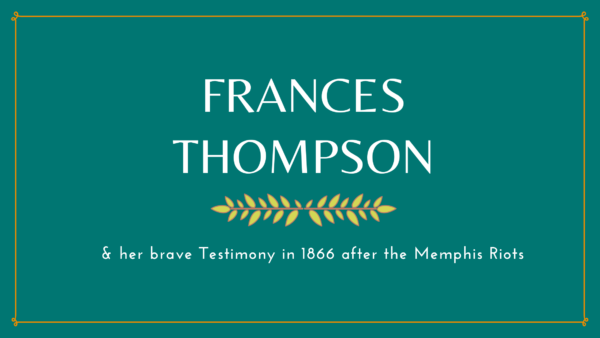During the Memphis Riots in 1866, Frances Thompson and her roommate Lucy Smith were attacked in their home. At the time of the attack, Frances and Lucy were formerly enslaved Black women, now living freely working as seamstresses. Both of these women, along with four other Black women– Mary Walker, Mollie Davis, Ellen Brown, and Lucy Hunt– bravely testified before congress in the aftermath of the Memphis Riots for various reasons. Ms. Thompson’s testimony was thrown out ten years later as, after an arrest and medical examination, it was publicized that Ms. Thompson was a transgender woman in The Pulaski Citizen, the daily newspaper. Unable to pay the fine, Ms. Thompson was thrown in jail and sent out on the chain gang– when prisoners were chained together in order to complete physical tasks. In the testimony provided, Ms. Thompson describes having a cancer in her foot and being unable to walk without crutches. From then on, Ms. Thompson’s identity was used to discredit her testimony of what happened years earlier during the riots.
Sexual assault survivors too often have their stories doubted. It is not easy for survivors to provide testimony against their perpetrators, still to this day. Survivors are not believed, and it is important to take into account their identities and how this affects their ability to heal, and be believed. Kimberlé Crenshaw coined the feminist term, intersectionality, which references the way in which our identities (race, gender, class, sex, ability, sexuality, etc.) can affect one another and further discrimination or increase privilege. With Frances Thompson, there are many intersections of her identity that lead to further discrimination and we can see that in the wrongful and forced publication in regards to her transgender identity as well as her living with a disability. People no longer believed her and began to use incorrect pronouns among other forms of verbal and physical abuse. Frances Thompson was a brave woman who testified against her perpetrators in 1866, and we look toward her as a woman of strength in this fight against sexual assault.
If you are interested in reading Ms. Thompson’s testimony, you can find it here on pages 196-197. To read the article clipping from The Pulaski Citizen, click here.
Written by Sarah Brennan, Activism and Volunteer Coordinator
All ZCenter blog posts are written by state certified staff, interns, and volunteers. For questions on authorship or content, please email kjones@zcenter.org.

